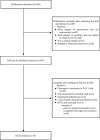Acupuncture for the treatment of tinnitus: a systematic review of randomized clinical trials
- PMID: 22805113
- PMCID: PMC3493359
- DOI: 10.1186/1472-6882-12-97
Acupuncture for the treatment of tinnitus: a systematic review of randomized clinical trials
Abstract
Background: Complementary and alternative medicine (CAM) has frequently been used to treat tinnitus, and acupuncture is a particularly popular option. The objective of this review was to assess the evidence concerning the effectiveness of acupuncture as a treatment for tinnitus.
Methods: Fourteen databases were searched from the dates of their creation to July 4th, 2012. Randomized clinical trials (RCTs) were included if acupuncture was used as the sole treatment. The Cochrane risk of bias tool was used to assess the risk of bias.
Results: A total of 9 RCTs met all the inclusion criteria. Their methodological quality was mostly poor. Five RCTs compared the effectiveness of acupuncture or electroacupuncture with sham acupuncture for treating tinnitus. The results failed to show statistically significant improvements. Two RCTs compared a short one-time scalp acupuncture treatment with the use of penetrating sham acupuncture at non-acupoints in achieving subjective symptom relief on a visual analog scale; these RCTs demonstrated significant positive effects with scalp acupuncture. Two RCTs compared acupuncture with conventional drug treatments. One of these RCTs demonstrated that acupuncture had statistically significant effects on the response rate in patients with nervous tinnitus, but the other RCT did not demonstrate significant effects in patients with senile tinnitus.
Conclusions: The number, size and quality of the RCTs on the effectiveness of acupuncture for the treatment of tinnitus are not sufficient for drawing definitive conclusions. Further rigorous RCTs that overcome the many limitations of the current evidence are warranted.
Figures
References
Publication types
MeSH terms
LinkOut - more resources
Full Text Sources
Medical
Miscellaneous


